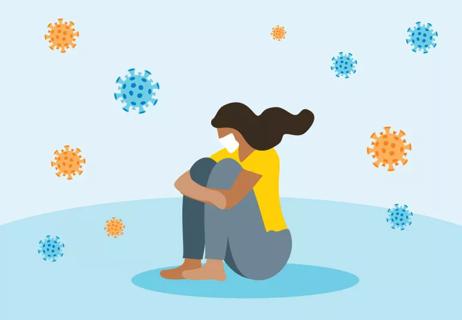From washing your hands and disinfecting surfaces to boosting your immune health, there are many ways to reduce your flu risk

While we usually think about it as a mere inconvenience, the flu can be quite serious. So, you may be wondering how to protect yourself and your loved ones.
Advertisement
Cleveland Clinic is a non-profit academic medical center. Advertising on our site helps support our mission. We do not endorse non-Cleveland Clinic products or services. Policy
Infectious disease specialist Steven Gordon, MD, shares how to prepare for flu season and what precautions to take if you get the flu anyway.
You can’t completely flu-proof your life, but there’s plenty you can do to reduce your risk. Consider:
Studies show getting the flu vaccine lowers your chances of getting the flu — and if you do get it, you’re less likely to get seriously sick.
Doctors usually recommend flu shots for people over 6 months old, but they’re not right for everyone. Your healthcare provider can help you decide what’s best for you and your family.
“We recommend that people get a flu vaccine in September and October so they’re prepared at the start of flu season,” Dr. Gordon adds. “We have seen in recent years that flu season is showing up sooner and lasting longer than it used to. So, when possible, try to get the flu vaccine as soon as it’s available for you.”
The advice may seem stale, but it’s also true: Maintaining good hygiene can lower your chances of catching the flu.
The flu is airborne. That means that respiratory droplets and particles can get you sick. You can also catch the virus by touching contaminated surfaces — not to mention coming in close contact with someone who’s already infected.
Advertisement
When it comes to flu prevention, Dr. Gordon says not to underestimate the importance of:
“Act as if” is a great motto for respiratory season prep. By maintaining your house like you would if you knew someone living there was sick, the flu is less likely to take up residence. Dr. Gordon advises that you:
If somebody in your house actually is sick, consider creating “sick spaces.” If you have two bathrooms in your house, for example, assign one of them to family members who are sick.
This approach isn’t always practical — especially if it’s your kid who’s got the flu. But it may help keep the flu from spreading through your whole household.
Building a strong immune system is one of the most important things you can do to reduce your flu risk. You can support your body’s defenses by:
Some people choose to wear masks during cold and flu season, especially in crowded spaces, while traveling or when they’re around people at a higher risk for complications.
“While it’s not for everyone, studies show masking can help reduce the spread of illness in close-contact settings,” Dr. Gordon says.
During flu season, noticing symptoms fast can make a big difference, both for you and the people around you.
“If you’re feeling fatigued, or you’re getting chills, don’t dismiss it,” Dr. Gordon stresses. “Assume you’re getting the flu and get ahead of your symptoms.” You can do that by:
If you think you might have the flu, Dr. Gordon recommends contacting your primary care provider.
“Ask if you are a candidate for the antiviral medications,” Dr. Gordon suggests. “They may help you bounce back faster.”
Advertisement
It’s also considerate to stay home when you’re sick, especially if you have a fever or spend time around people who are more vulnerable. And here’s a bonus: That extra rest may speed up your recovery!
“Influenza is most contagious between the day before you start developing symptoms and the following five to seven days,” explains Dr. Gordon. “Staying home and avoiding others can reduce the likelihood of spreading the virus.”
Dr. Gordon suggests keeping a few basics on hand in case the flu hits. Essentials include:
“There are a lot of great over-the-counter medications that you can use for symptom relief,” he explains. “You can also get a flu and cold medication to help cut down on the nasal stuffiness and the cough that you might have.”
If you have a health condition that puts you at a greater risk for severe illness, it may also be helpful to have a pulse oximeter at home. This device measures how much oxygen is in your blood.
Call your provider if your pulse oximeter reading is 95%. Call an ambulance if it’s 88% or lower.
Many of the steps you take to help prevent the flu can also keep other viruses at bay — like respiratory syncytial virus (RSV), norovirus (stomach flu) and even the common cold. That’s why simple habits like washing your hands often, disinfecting high-touch surfaces, covering coughs and sneezes, and staying home when you’re sick aren’t just for flu season.
Advertisement
“Every season is infectious disease season,” Dr. Gordon says with a smile. “The best-case scenario is that these precautions become like second nature. After all, your health is worth protecting year-round.”
Advertisement

Sign up for our Health Essentials emails for expert guidance on nutrition, fitness, sleep, skin care and more.
Learn more about our editorial process.
Advertisement

They can feel similar, but the differences matter — especially if you’re at higher risk for complications

The two main strains of the flu have a lot in common, but type A causes more cases and more severe illness than type B

Pasteurized milk is considered safe, but there are concerns about avian influenza spreading through raw, unpasteurized milk

The flu can make kids seriously sick, so watch for signs of dehydration and breathing problems

Tamiflu can shorten your child’s illness and even help prevent the flu

You may be spreading the flu virus before your symptoms start and up to a week after

While it typically starts in October, vaccine effectiveness can affect its duration and severity

Influenza puts stress on your body and can lead to serious conditions like pneumonia or stroke

Even small moments of time outdoors can help reduce stress, boost mood and restore a sense of calm

A correct prescription helps your eyes see clearly — but as natural changes occur, you may need stronger or different eyeglasses

Both are medical emergencies, but they are very distinct events with different causes